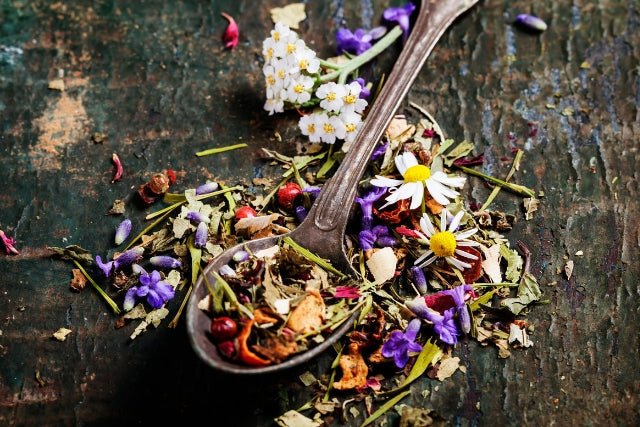

Herbal teas have been cherished for centuries, not only for their delightful flavors but also for their numerous health benefits. Unlike traditional teas made from the Camellia sinensis plant, herbal teas are typically crafted from a variety of plants, herbs, and spices. This distinction often means they are caffeine-free and packed with unique properties that can contribute positively to overall health and wellness.
1. Chamomile Tea

Chamomile tea, made from the dried flowers of the Matricaria chamomilla plant, is one of the most well-known and widely consumed herbal teas. Its mild, slightly sweet taste and soothing aroma have made it a favorite bedtime beverage for centuries.
Health Benefits of Chamomile Tea
Promotes Sleep and Relaxation: Chamomile tea is often praised for its calming effects, making it an excellent natural remedy for those struggling with insomnia or anxiety. The presence of apigenin, an antioxidant that binds to specific receptors in the brain, helps decrease anxiety and initiate sleep. Regular consumption of chamomile tea before bed can lead to improved sleep quality and a more restful night.
Anti-Inflammatory and Antiseptic Properties: Chamomile tea is known for its anti-inflammatory and antiseptic properties. These qualities make it beneficial for treating minor wounds and skin irritations. The tea can be used as a mild mouthwash to soothe gum inflammation and prevent oral infections. Topically, it can help with conditions such as eczema and rosacea by reducing redness and irritation.
Promotes Skin Health: The antioxidants and anti-inflammatory properties in chamomile tea can help promote healthier skin. Drinking chamomile tea can help reduce skin irritations and conditions like acne. Additionally, applying cooled chamomile tea to the skin can soothe sunburns, rashes, and minor cuts, enhancing the healing process.
2. Ginger Tea

Ginger tea, made from the root of the Zingiber officinale plant, is a spicy and invigorating herbal tea that has been used in traditional medicine for centuries. Its distinctive flavor and numerous health benefits make it a popular choice among herbal tea enthusiasts.
Health Benefits of Ginger Tea
Anti-Nausea and Digestive Aid: Ginger tea is renowned for its ability to alleviate nausea and vomiting, making it a popular remedy for morning sickness during pregnancy, motion sickness, and chemotherapy-induced nausea. The active compounds in ginger, such as gingerols and shogaols, help stimulate saliva and bile production, which aids in digestion and helps prevent stomach discomfort and bloating.
Anti-Inflammatory and Pain Relief: Ginger tea’s powerful anti-inflammatory properties can help reduce pain and inflammation in conditions such as osteoarthritis and rheumatoid arthritis. Drinking ginger tea regularly can help decrease muscle soreness and menstrual pain, making it a natural alternative to over-the-counter pain relievers.
Fights Cold and Flu: Ginger tea is a well-known remedy for fighting cold and flu symptoms. Its warming effect helps soothe sore throats, and its antiviral and antibacterial properties help combat infections. Drinking ginger tea can help reduce congestion and stimulate the immune system, providing relief from common cold symptoms.
3. Fruit & Berry Tea

Fruit and berry teas are vibrant and flavorful blends made from a variety of dried fruits, berries, and sometimes flowers. These teas are naturally caffeine-free and can be enjoyed hot or cold, making them a versatile and refreshing choice.
Health Benefits of Fruit & Berry Tea
Rich in Antioxidants: Fruit and berry teas are packed with antioxidants, which help combat free radicals in the body and protect cells from damage. These antioxidants, such as anthocyanins and flavonoids, are especially abundant in berries and contribute to a reduced risk of chronic diseases such as heart disease and cancer. Regular consumption of fruit and berry teas can lead to improved overall health and vitality.
Vitamin C Boost: Many fruit and berry teas contain high levels of vitamin C, which is essential for a robust immune system. Vitamin C helps stimulate the production of white blood cells, which are crucial for fighting off infections. Additionally, it aids in the absorption of iron from plant-based foods and contributes to healthy skin by promoting collagen production.
4. Rooibos Tea

Rooibos tea, also known as red bush tea, is made from the leaves of the Aspalathus linearis plant, native to South Africa. This naturally caffeine-free tea is known for its rich, earthy flavor and a host of health benefits.
Health Benefits of Rooibos Tea
Heart Health: Rooibos tea is beneficial for heart health due to its high levels of antioxidants, such as aspalathin and nothofagin. These compounds help protect the heart by reducing oxidative stress and inflammation. Rooibos tea can also help lower blood pressure by inhibiting the angiotensin-converting enzyme (ACE), which can restrict blood vessels and lead to increased blood pressure. Additionally, rooibos tea has been shown to lower "bad" LDL cholesterol levels and increase "good" HDL cholesterol levels, further supporting cardiovascular health.
Bone Health: Rooibos tea contains essential minerals like calcium, manganese, and fluoride, which are crucial for maintaining strong bones and teeth. Regular consumption of rooibos tea can help increase bone density and reduce the risk of osteoporosis. The presence of flavonoids in rooibos tea also promotes bone health by stimulating bone growth and repair.
Conclusion
Herbal teas offer a delightful and natural way to enhance your health and well-being. From promoting relaxation and aiding digestion to boosting the immune system and supporting heart health, these caffeine-free beverages provide a wide range of benefits. Incorporating herbal teas into your daily routine can lead to a healthier, more balanced lifestyle.
